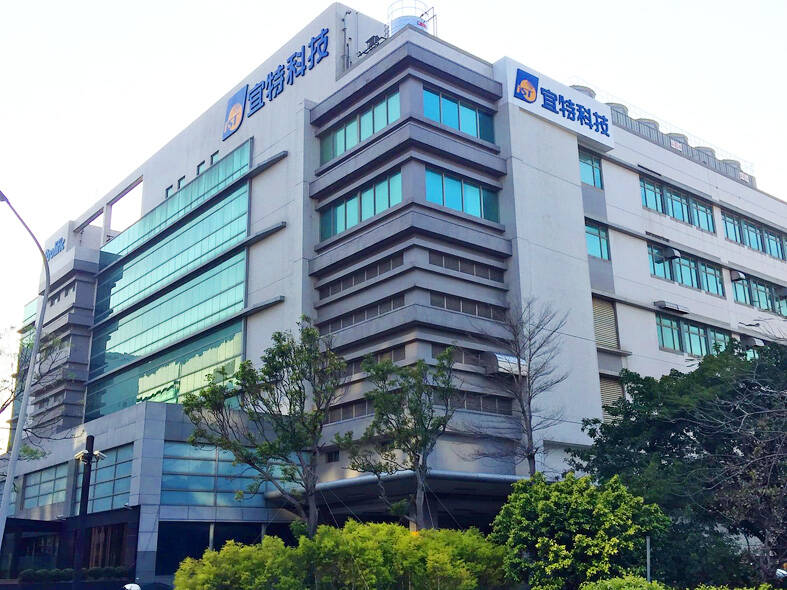Integrated Services Technology Inc (IST, 宜特科技), which provides semiconductor reliability testing, failure analysis and material analysis services, yesterday said that its net profit last quarter soared 65.39 percent annually, bucking a downtrend in the semiconductor industry.
The company expects the growth momentum to carry into the second half of this year, as leading global electronic companies continue to invest in developing generative artificial intelligence (AI) chips.
Chipmakers are also refocusing their research efforts into developing automotive chips, including display chips, ethernet chips and bluetooth chips, to diversify from chips used in consumer electronics, IST said.

Photo: Grace Hung, Taipei Times
The company remains optimistic, despite industry forecasts that the semiconductor inventory correction might extend into this quarter and smartphone demand remains in the doldrums, according to the statement.
Net profit rose to NT$151.27 million (US$4.87 million) during the quarter ending on June 30, compared with NT$91.47 million in the second quarter last year, marking its best second-quarter performance.
On a quarterly basis, net profit jumped 54.43 percent from NT$97.96 million.
Earnings per share (EPS) expanded to NT$2.02 last quarter from NT$1.22 a year earlier and from NT$1.31 a quarter earlier. Last quarter’s EPS was the best in about 13 quarters, it said.
The company attributed the robust growth to demand for material analysis, failure analysis, and reliability analysis for automotive and AI chips, IST said.
Growth in those areas helped offset weakness in demand for chips used in consumer electronics and excess inventory, it said.
Gross margin improved to 28.41 percent last quarter from 26.16 percent in the same period last year. On a quarterly basis, gross margin moderated slightly from 28.49 percent in the first quarter.
Revenue last quarter rose 6.81 percent year-on-year to NT$973.05 million from NT$910.98 million. That was a quarterly decline of 0.84 percent compared with NT$981.32 million.
About half of the company’s revenue came from offering reliability test services.

RUN IT BACK: A succesful first project working with hyperscalers to design chips encouraged MediaTek to start a second project, aiming to hit stride in 2028 MediaTek Inc (聯發科), the world’s biggest smartphone chip supplier, yesterday said it is engaging a second hyperscaler to help design artificial intelligence (AI) accelerators used in data centers following a similar project expected to generate revenue streams soon. The first AI accelerator project is to bring in US$1 billion revenue next year and several billion US dollars more in 2027, MediaTek chief executive officer Rick Tsai (蔡力行) told a virtual investor conference yesterday. The second AI accelerator project is expected to contribute to revenue beginning in 2028, Tsai said. MediaTek yesterday raised its revenue forecast for the global AI accelerator used

Taiwan Semiconductor Manufacturing Co (TSMC, 台積電) has secured three construction permits for its plan to build a state-of-the-art A14 wafer fab in Taichung, and is likely to start construction soon, the Central Taiwan Science Park Bureau said yesterday. Speaking with CNA, Wang Chun-chieh (王俊傑), deputy director general of the science park bureau, said the world’s largest contract chipmaker has received three construction permits — one to build a fab to roll out sophisticated chips, another to build a central utility plant to provide water and electricity for the facility and the other to build three office buildings. With the three permits, TSMC

TEMPORARY TRUCE: China has made concessions to ease rare earth trade controls, among others, while Washington holds fire on a 100% tariff on all Chinese goods China is effectively suspending implementation of additional export controls on rare earth metals and terminating investigations targeting US companies in the semiconductor supply chain, the White House announced. The White House on Saturday issued a fact sheet outlining some details of the trade pact agreed to earlier in the week by US President Donald Trump and Chinese President Xi Jinping (習近平) that aimed to ease tensions between the world’s two largest economies. Under the deal, China is to issue general licenses valid for exports of rare earths, gallium, germanium, antimony and graphite “for the benefit of US end users and their suppliers

Dutch chipmaker Nexperia BV’s China unit yesterday said that it had established sufficient inventories of finished goods and works-in-progress, and that its supply chain remained secure and stable after its parent halted wafer supplies. The Dutch company suspended supplies of wafers to its Chinese assembly plant a week ago, calling it “a direct consequence of the local management’s recent failure to comply with the agreed contractual payment terms,” Reuters reported on Friday last week. Its China unit called Nexperia’s suspension “unilateral” and “extremely irresponsible,” adding that the Dutch parent’s claim about contractual payment was “misleading and highly deceptive,” according to a statement